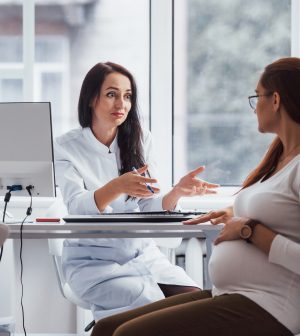- Could Your Grocery Store Meat Be Causing Recurring UTIs?
- Are You Making This Expensive Thermostat Error This Winter?
- Recognizing the Signs of Hypothyroidism
- 10 Strategies to Overcome Insomnia
- Could Artificial Sweeteners Be Aging the Brain Faster?
- Techniques for Soothing Your Nervous System
- Does the Water in Your House Smell Funny? Here’s Why
- Can a Daily Dose of Apple Cider Vinegar Actually Aid Weight Loss?
- 6 Health Beverages That Can Actually Spike Your Blood Sugar
- Treatment Options for Social Anxiety Disorder
Breast Cancer Survivors Can Safely Interrupt Therapy During Pregnancy: Study

For young women who survive breast cancer, a new study offers some reassurance about pregnancy: Pausing hormonal therapy to have a baby does not raise the risk of a cancer recurrence, at least in the shorter term.
A trial of more than 500 young women treated for breast cancer found no signs of harm from interrupting standard hormone therapy to have a baby. Over three years, patients’ risk of a cancer recurrence was no higher than that of similar women who did not have a hormone therapy pause.
Experts said the results, published May 4 in the New England Journal of Medicine, should come as welcome news to young women who face a dilemma after breast cancer: Could starting a family increase the chances of a cancer comeback?
“This is a huge issue for patients,” said Dr. Sharon Giordano, of the University of Texas MD Anderson Cancer Center in Houston.
Broadly, there have been two major concerns, explained Giordano, who wrote an editorial published with the findings.
One is whether pregnancy, and its hormonal fluctuations, could raise the risk of a breast cancer recurrence. Most breast cancers are hormone-sensitive, which means estrogen helps fuel their growth.
However, Giordano said, research findings so far have been reassuring — with no signs that women who become pregnant after breast cancer have a worse outlook than other young women treated for the disease.
The new study addressed the other big concern: For women with hormone-sensitive cancer, standard treatment involves five to 10 years of medication that blocks estrogen activity, to reduce the chances of a recurrence.
The problem is, women cannot take those drugs during pregnancy or when they’re trying to conceive.
A potential go-around is to put a temporary pause on hormone therapy to allow a woman to conceive, have a baby and, if she wants, breastfeed. But that, in theory, could dampen the effectiveness of the therapy.
“These are young women with a long time to live, and we don’t want to do anything to tinker with their risk of a recurrence,” said lead researcher Dr. Ann Partridge, a medical oncologist at Dana-Farber Cancer Institute in Boston.
“We need to be able to address this really important question for young women and their families, and their doctors,” Partridge said.
In the study, she and her colleagues enrolled 516 women age 42 or younger who had been treated for breast cancer and wanted to become pregnant. Nearly all had been diagnosed with early (stage 1 or 2) breast cancer, and all had been on hormone therapy for at least 18 months without a recurrence.
Partridge’s team came up with a protocol: Patients had to be off of hormone therapy for three months before trying to conceive, and they could stay off for up to two years before they were “strongly” encouraged to start the therapy again.
Overall, three-quarters of the women became pregnant during the trial, and 64% had at least one baby. Many women — 43% — used assisted reproduction, which is not unexpected, the doctors said. That’s because it’s common for women to freeze their eggs, or embryos, ahead of certain cancer treatments, to preserve their fertility.
Over roughly three years, just under 9% of patients had a breast cancer recurrence.
To put that into context, Partridge’s team compared their patients with a similar group of young breast cancer patients who’d participated in two trials of hormone therapy. In those studies, the three-year risk of a cancer recurrence was nearly identical — at just over 9%.
“This was a very well-designed and well-conducted trial,” Giordano said, “and the findings are really reassuring. I think this is wonderful news for patients.”
That said, both doctors cautioned that an important question remains: Could the therapy interruption have ill effects farther down the line? Breast cancer recurrences can happen a decade or more later, and Partridge said her team will continue to follow the trial patients over the longer term.
The study turned up some other positives, as well. There were no signs that babies had an increased risk of birth defects, Partridge said. And most women resumed their hormone therapy. About 15% had not within four years.
Partridge stressed that this approach is “not for everyone,” as most study patients had early stage cancer.
But for women like them, both doctors said, the findings offer critical information for making choices about pregnancy.
“Ultimately,” Partridge said, “this is a very personal decision for a woman and her family.”
More information
The American Cancer Society has more on pregnancy after breast cancer.
SOURCES: Ann Partridge, MD, MPH, medical oncologist, Dana-Farber Cancer Center, and professor, medicine, Harvard Medical School, Boston; Sharon Giordano, MD, MPH, chair, department of health services research, and professor, medicine, department of breast medical oncology, University of Texas MD Anderson Cancer Center, Houston; New England Journal of Medicine, May 4, 2023
Source: HealthDay
Copyright © 2026 HealthDay. All rights reserved.










